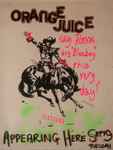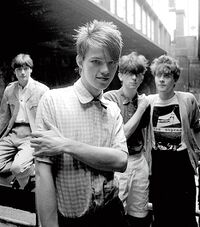Orange Juice: Difference between revisions
No edit summary |
No edit summary |
||
| (3 intermediate revisions by the same user not shown) | |||
| Line 1: | Line 1: | ||
[[File:Orange Juice thumb.jpg | 200px | right | thumb |Orange Juice]] | |||
[[Category:Influenced by Morrissey / The Smiths]] | [[Category:Influenced by Morrissey / The Smiths]] | ||
==Relevance== | ==Relevance== | ||
Edwyn Collins used to dedicate the song "I Guess I'm Just a Little Too Sensitive" to Morrissey on the tour promoting his "The Orange Juice" album. | |||
{{Page | {{Page | ||
|DiscogsArtistId=233784 | |DiscogsArtistId=233784 | ||
|WikipediaPageTitle=Orange_Juice_(band) | |WikipediaPageTitle=Orange_Juice_(band) | ||
}} | }} | ||
Latest revision as of 17:34, 22 December 2023
Relevance
Edwyn Collins used to dedicate the song "I Guess I'm Just a Little Too Sensitive" to Morrissey on the tour promoting his "The Orange Juice" album.
Discogs Information
Profile
Scottish post-punk band formed in Bearsden, Glasgow. The band started out as the Nu-Sonics in 1976. They changed their name to Orange Juice in May 1979 and signed with Alan Horne's Postcard Records. Their first record 'Falling and Laughing' was also the first Postcard release.
External Links
- https://www.discogs.com/artist/233784-Orange-Juice-3
- http://www.edwyncollins.com/
- https://en.wikipedia.org/wiki/Orange_Juice_(band)
Wikipedia Information
 |
Orange Juice were a Scottish jangle pop band founded in the Glasgow suburb of Bearsden as the Nu-Sonics in 1976. They became Orange Juice in 1979, and took inspiration by contemporary punk bands including Subway Sect, Television, and Buzzcocks but also 1960s acts, most notably the Byrds and the Velvet Underground. Musically, the band brought together styles and genres that often appeared incongruous, for example, country, disco and punk. The band released their first singles during 1980 and 1981 on the independent Postcard Records label founded by Alan Horne, along with fellow Scottish bands Josef K and Aztec Camera. Orange Juice's 'neo acoustic', jangly guitar sound – as evident in singles including "Blue Boy" and "Simply Thrilled Honey" – came to define 'The Postcard Sound' that directly influenced acts as diverse as the Bluebells, Haircut One Hundred and the Smiths. Despite their association with the independent scene, the band signed to the major label Polydor Records in 1981 and recorded their first album, You Can't Hide Your Love Forever for them. However, internal tensions led to splits in the band in late 1981, with their second album, released in late 1982, showing more pop sensibilities and combining their guitar-based sound with disco influences. The band's only top 40 hit, "Rip It Up" was achieved with the aid of the synthesizer – it was the first hit to use the Roland TB-303. "Rip It Up" reached number 8 on the UK Singles Chart in February 1983. Subsequent singles failed to chart as highly, but the band continued to be critically acclaimed, finally splitting up in January 1985 after a gig for the UK miners' strike. Their three albums have been subsequently reissued and remastered on several occasions, with a major career-spanning box set Coals to Newcastle released in 2010. Edwyn Collins pursued a successful solo career following the band's split, whilst other members James Kirk, David McClymont, Malcolm Ross and Zeke Manyika have had lower-profile solo releases. The original line-up of the band reunited once in 2008 to be honoured for their influence on Scottish music, but the band has never reformed.
